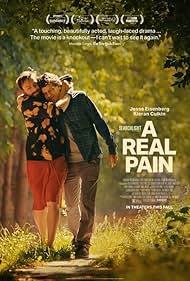We shouldn’t have to pay for train tickets in Poland
Line of Events
Mismatched cousins reunite for a tour of Poland to honor their beloved grandmother. The adventure takes a turn when the mismatched pair’s old tensions resurface against the backdrop of their family history. When Benji and David visit their grandmother’s house in Poland, the location is where Jesse Eisenberg lives. The real ancestors settled in the diaspora.Benji Kaplan: We keep moving, we keep light, we keep agile.David Kaplan: Yes.Benji Kaplan: The conductor comes by, takes tickets, we tell him we’re going to the bathroom.David Kaplan: Toilet.Benji Kaplan: He comes to the back of the train and makes his way to the front, looking for stragglers.David Kaplan: Sorry, we’re the stragglers?Benji Kaplan: Yes. When he gets to the front, the train will be in the station and we’re home free.David Kaplan: That’s so damn stupid. Tickets are probably twelve dollars.Benji Kaplan: That’s the principle of the thing.
3 in F major, written by Frederic Chopin, performed by Tzvi Erez
This is our country.David Kaplan: No, it’s not, it was our country. They kicked us out because they thought we were cheap.Featured on CBS News Sunday Morning: Episode #46.44 (2024). 12 Etudes, Op. 25, no. Jesse Eisenberg’s second work as writer and director is set to be something unconventional. There’s something of Richard Linklater’s BEFORE trilogy in A REAL PAIN’s DNA, with some recognizable nods to Michael Winterbottom’s TRIP series.
it doesn’t quite work
The shifting pace, the languid cinematography that asks you to look beneath the surface of tourist sights, the dialogue that meanders through an unpretentious and unstructured portrayal of the meaning of life, the complete absence of any “bad guys”… the near-total lack of outright conflict, the slightest hint of a goal driving the plot beyond completing a simple travel itinerary… “A Real Pain” shares all of these realistic hallmarks with the earlier, more spirited and life-affirming films. But somehow… I’m not sure what it was that made me never really care about this film. I think a big part of it has to do with all of the supporting characters (well, all except the cousins played by Eisenberg and Kieran Culkin).
the characters are all very basic, very conventional, very boring
Will Sharpe’s non-Jewish tour guide, the Rwandan convert, the old couple, the sexy divorcee… The actors playing them are fine, but they’re not given much to do, and so they seem unnatural and lifeless, more like stage decorations than people. I think Eisenberg knows how to operate a camera; he knows how to use the right cinematic elements. But maybe he doesn’t know how to direct actors, or maybe he just doesn’t know how to write characters. There’s never any indication that these people exist beyond the moments we see them, which perhaps could have been remedied by a little more spontaneous improvisation from the actors. Eisenberg and especially Culkin are better in this regard, but there’s still something quite stilted and “scripted” about a lot of what they say and do.
This is a decent indie film with a few good laughs, a few interesting ideas, a memorable tour of Poland, and a solid performance from Culkin
Eisenberg’s “workaholic salesman with OCD” is mostly one-dimensional, and the few times his character goes beyond that façade feel more like forced acting than a real glimpse into something deeper. Culkin is wonderful – perhaps a glimpse of his successor character, if Roman Roy actually cared about people – but I think that’s just a credit to Culkin’s talent; he somehow manages to go beyond what he can work with.

